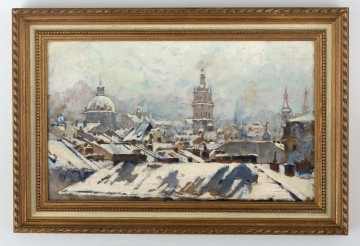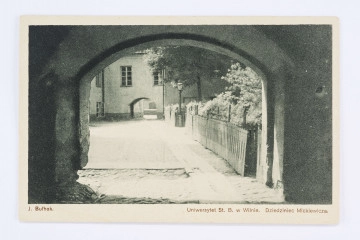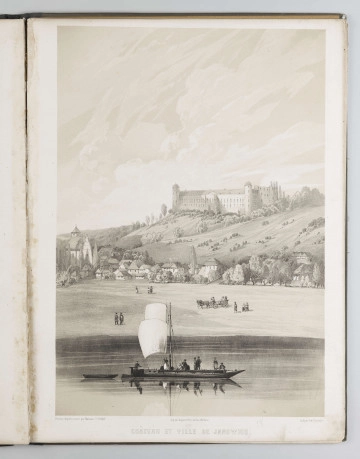
View of Lviv
1923
National Museum in Lublin
Part of the collection: Landscape
Rouba was a painter of Vilnius and its landscapes. In his work he constantly returned to this theme, searching for new and appropriate means of painting expression. His work grew out of many traditions forming the artistic landscape of the inter-war period. He started his studies in Jacek Malczewski's studio in Krakow, and later in Ferdynand Ruszczyc's studio in Vilnius, looking for symbolism, expression and individual expression in their works. After a trip to France in the early 1920s, his landscapes became more concise, based on short brush strokes, derived from the tradition of Cézanne. At the same time, the small formats of the canvases showed monumentalised forest scenes alluding to Romantic landscapes, combining the monumental element of nature with generic, Arcadian depictions of bathing figures.
Rouba's work encompassed two aspects of landscape painting – distanced observations of panoramic scenes and urban imagery, and vedutas shaped by a narrow approach to tightly built compositions. Ulica Mickiewicza [Mickiewicza Street] – the main artery of old and contemporary Vilnius – is a painterly transposition into an intimate study filled with dense wooden buildings. The scene filled with strong light is devoid of details, reduced to a geometric rhythm of coloured blocks and planes, a narrow strip of street and an abandoned wooden wheelbarrow. Into this empty, subdued urban landscape is integrated a female figure standing in the doorway, shown frontally, generalised, devoid of individuality. At the same time, the Vilnius landscape is shown with unusual intimacy, warmly, treated provincially but also tenderly. In 1930 Rouba spent his holidays in Italy, where he found inspiration for a new formula of landscape, colourful, illuminated, filled with buildings.
This new, neo-realist phase of the artist's work marked a return to direct observation, devoid of the baggage of various traditions and painting conventions. The clear, precise and simply-formulated painterly language was to lead to the depiction of intimacy with the place, the urban landscape, in search of backstreets and empty places, filled with a cheerful mood and an unpretentious way of recreating it. Familiarity meant distance from the hustle and bustle of modern metropolises.
Marcin Lachowski
Author / creator
Dimensions
cały obiekt: height: 45 cm, width: 36 cm
Object type
painting
Technique
oil technique
Material
oil-based paint, plywood
Creation time / dating
Creation / finding place
Owner
The National Museum in Lublin
Identification number
Location / status

Kuśmidrowicz, Jan
1923
National Museum in Lublin

Bułhak, Jan
1922 — 1939
National Museum in Lublin

Czernof, Barbara née Grotenów
1860
National Museum in Lublin
DISCOVER this TOPIC
National Museum in Lublin
DISCOVER this PATH
Educational path
0/500

We use cookies to make it easier for you to use our website and for statistical purposes. You can manage cookies by changing the settings of your web browser. More information in the Privacy Policy.
We use cookies to make it easier for you to use our website and for statistical purposes. You can manage cookies by changing the settings of your web browser. More information in the Privacy Policy.
Manage cookies:
This type of cookies is necessary for the website to function. You can change your browser settings to block them, but then the website will not work properly.
WYMAGANE
They are used to measure user engagement and generate statistics about the website to better understand how it is used. If you block this type of cookies, we will not be able to collect information about the use of the website and we will not be able to monitor its performance.